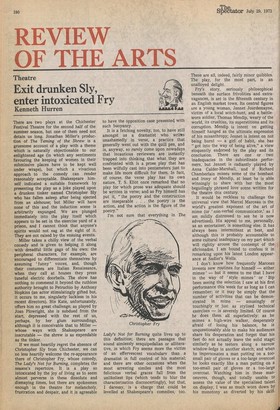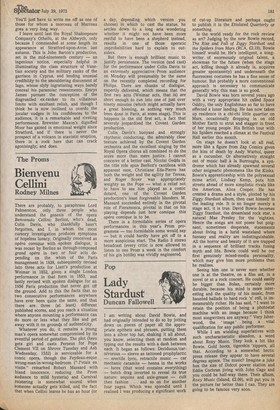Theatre
Exit drunken Sly, enter intoxicated Fry
Kenneth Hurren
There are two plays at the Chichester Festival Theatre for the second half of the summer season, but one of them need not detain us long. Jonathan Miller's production of The Taming of the Shrew is a gruesome account of a play with a theme which is naturally objectionable to our enlightened age (in which any sentiments favouring the keeping of women in their submissive places have to be kept well under wraps), but which a vivacious approach to the comedy can render reasonably acceptable. Shakespeare himself indicated a suitable framework by presenting the play as a joke played upon a drunken tinker named Christopher Sly who has fallen asleep after being ejected from an alehouse; but Miller will have none of this and the induction scene is arbitrarily expunged. We are plunged immediately into the play itself which appears to be set in the exercise yard of a prison, and I cannot think that anyone's spirits would not sag at the sight of it. They are not raised by the ensuing events.
Miller takes a chilly view of the verbal comedy and is given to helping it along with dreadful little gags of his own: the peripheral characters, for example, are encouraged to differentiate themselves by assuming ' funny ' voices, and, though their costumes are Italian Renaissance, when they call at houses they press tuneful electric doorbells. The show has nothing to commend it beyond the ruthless authority brought to Petruchio by Anthony Hopkins (an actor stimulatingly gifted but, it occurs to me, singularly luckless in his recent directors). His Kate, unfortunately, offers him no great challenge; as played by Joan Plowright, she is subdued from the start, depressed with the rest of us, perhaps, by her glum surroundings, although it is conceivable that to Miller — whose ways with Shakespeare are inscrutable — the shrew is as expendable as the tinker.
If we must heartily regret the absence of Christopher Sly from Chichester, we can no less heartily welcome the re-appearance there of Christopher Fry, whose comedy, The Lady's Not for Burning, completes the season's repertoire. It is a play so intoxicated by the joy of living as to seem almost perverse in these dissolute and dismaying times, but there are spokesmen enough in the theatre for melancholy, frustration and despair, and it ,is agreeable to have the opposition case presented with such buoyancy.
It is a fetching novelty, too, to have still amongst us a dramatist who writes unashamedly in verse, a practice that generally went out with the quill pen, and is, anyway, so rarely come upon nowadays that incautious reviewers are instantly trapped into thinking that what they are confronted with is a prose play that has been wilfully cast into pentameters just to make life more difficult for them. In fact, of course, the verse play has its own nature. T. S. Eliot once remarked that no play for which prose was adequate should be written in verse; and as Fry himself has put it, "the poetry and the construction are inseparable . . . the poetry is the action, and the action is the figure of the poetry."
I'm not sure that everything in The Lady's Not for Burning quite lives up to this definition; there are passages that sound aimlessly sesquipedalian or alliterative, in which Fry seems more the victim of an effervescent vocabulary than a dramatist in full control of his material; and there are other occasions when the most arresting similes and the most felicitous verbal graces fall from the unlikeliest lips (which tends to blur the characterisation disconcertingly), but that, I daresay, is a charge that could be levelled at Shakespeare's comedies; too. These are all, indeed, fairly minor quibbles. The play, for the most part, is an unalloyed delight.
Fry's story, seriously philosophical beneath the surface frivolities and extravagances, is set in the fifteenth century in an English market town. Its central figures are a young woman, Jennet Jourdemayne, victim of a local witch-hunt, and a battleworn soldier, Thomas Mendip, weary of the world, its cruelties, its superstitions and its corruption. Mendip is intent on getting himself hanged as the ultimate expression of his misanthropy; Jennet is intent on not being burnt — a girl of habit, she has "got into the way of being alive," a view eloquently endorsed by the play and its conclusion. There are one or two inadequacies in the subordinate performers, but Jennet is radiantly played by Anna Calder-Marshall, and if Richard Chamberlain misses some of the bombast and irony of Mendip, at least he is able winningly to share with her the most beguilingly phrased love scene written for the theatre this century.
It would be reckless to challenge the universal view that Marcel Marceau is the world's greatest exponent of the art of mime (or 'non-verbal communicator,' as I am mildly distressed to see he is now advertised). His appeal to me, personally, as an entertainer, is something else. It has always been intermittent at best, and although this is probably accountable to some cultural inadequacy on my part Which will rightly arouse the contempt of the aficionados, I am bound to confess it in remarking upon his latest London appearance at Sadler's Wells.
I don't know how frequently Marceau invents new routines for himself — either mimes' — but it seems to me that I have in the way of 'style mimes' or ' Bip been seeing the selection I saw at his first performance this week for as long as I can remember; or it may be simply that the number of activities that can be demonstrated in mime — amusingly or touchingly or just as stylised technical exercises — is severely limited. Of course he does them all superlatively: as he mimes a high-wire walker, desperately afraid of losing his balance, he is unquestionably able to make his audiences share his desperation and forget that his feet do not actually leave the solid stage; similarly as he teeters along a narrow window-ledge in another sketch; and when he impersonates a man putting on a t00 small pair of gloves or a too-large overcoat he looks exactly like a man putting on a too-small pair of gloves or a too-large overcoat. Watching him in these manoeuvres, though, and totally unable to assess the value of the specialised talent on display, I was as much worn down bY his monotony as diverted by his skill. You'll just have to write me off as one of those for whom a morceau of Marceau goes a very long way.
I leave until last the Royal Shakespeare Company's Othello, at the Aldwych, only because I commended at some length its appearance at Stratford-upon-Avon last autumn. This is John Barton's production, set in the mid-nineteenth century — an ingenious notion, especially helpful in illuminating the class structure of Venetian society and the military ranks of the garrison in Cyprus, and lending unusual credibility to the smouldering discontent of Iago, whose slyly ingratiating ways barely conceal his paranoiac resentments. Emrys James pursues the conception of the disgruntled ex-ranker to its villainous limits with exultant relish, and though I think he is now inclined to overdo the jocular nudges in his confidences to the audience, it is a remarkable and riveting performance. Brewster Mason's dignified Moor has gained in emotional weight since Stratford, and if there is never the prospect of a volcano in atavistic eruption, there is a rock here that can crack agonisingly; and does.









































 Previous page
Previous page